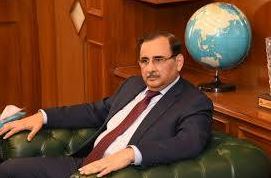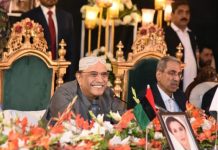KARACHI, MAR 17 /DNA/ – The Federation of Pakistan Chambers of Commerce and Industry’s Businessmen Panel (BMP) has feared that political climate of the country has become unpredictable due to political uncertainty, reducing the level of investment and affecting the economic growth of the country, suggesting the government as well as the opposition parties to settle issues through talks in parliament, which the right way to resolve the issues.
Businessmen Panel (BMP) Chairman Mian Anjum Nisar appealed the political leadership to act wisely and show commitment with the country, as the lack of political stability is ruining the trade and economic activities in the country.
The FPCCI former president said that this situation might create unstable economic conditions, generating higher risks, and transforms into low investment while inflation is one of the key sources of uncertainty. The high rate of inflation leaves the nation uncertain about potential investments, he added. He said that the financial sector is stable, as the government has continuously been bringing reforms in different sectors. He said that the government has been working on sustainable growth which will boost up to 6% further. He said several reforms had been made in industrialization, housing and agricultural sector.
He said that political circles should lay down their differences in the larger interest of the country and resolve their issues through parliament, he added.
Mian Anjum Nisar said trade and economic activities are being submerged therefore the business community appeals to the stakeholders to stay away from such politics which is creating anarchy like situation.
He said that the country is facing a huge economic loss only because of wrong statements and irrational attitude of political players. He said that a week of stalled economic activity costs the country around $ 500 million and $2 billion per month and poor economy like Pakistan cannot afford even one million dollar loss to exports. He said that at a time when country is facing severe internal and external challenges, the situation is bound to affect the national interests.
He said that such activities would not only tarnish the image of the country in the eyes of international community but would also hinder economic growth. He said that the leadership of all political parties should join hands for strengthening the economy instead of hatching conspiracies against the government for their vested interests.
He said that in the past, politics of agitation has caused irreversible loss to the national economy besides tarnishing the soft image of the country. He said that in present scenario, country cannot afford to bear more economical loss. He said that business community is the main stakeholder of the economy and it should not be treated as useless thing.
He said the economy of Pakistan was on the path of sustainable growth due to successful economic policies of the government.
He appreciated the government to make all out efforts for reducing the negative effects of inflation by creating conducive atmosphere for investors, jobs for youth and targeted subsidies.
He attributed the higher economic growth to rising exports, increasing remittances and improving tax collection that had gone up by 32 percent. However, he also said the economy had to face certain difficulties due to higher commodity prices in the international market. The utilization of electricity had gone up by 13 per cent whereas the corporate profits were also at historic high, he said. The Pakistan economy has continued to recover despite the challenges of the Covid-19 pandemic, but imbalances have widened and risks remain elevated. Timely and consistent implementation of policies and reforms remain essential to lay the ground for stronger and more sustainable growth, he said.
Pakistan can double its traditional exports in next five years and lift exports by providing incentives to the sector and building a strong ecosystem for startups in the country, he said.
He said the government is also focusing on improving productivity by reviving industries and improving the agriculture sector.
He said that China has planned to shift up to 85 million jobs to foreign countries in next 10 years and Pakistan government can request the Chinese leadership to move at least 10 million jobs to Pakistan by relocating its key industrial units to special economic zones in the country, he suggested. He said that China can increase imports from Pakistan that would also improve productivity and generate more opportunities for jobs in the country.

















